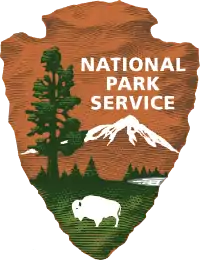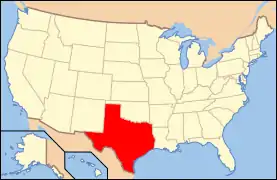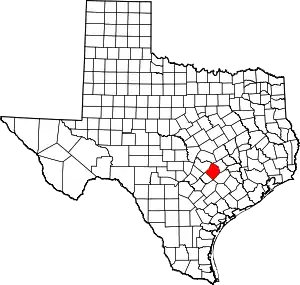Bastrop State Park
Bastrop State Park is a state park in Bastrop County in Central Texas. The park was established in 1938 and consists of stands of loblolly pines mixed with post oak and junipers.
Bastrop State Park | |
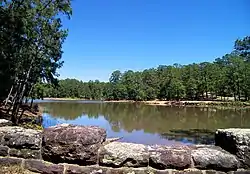 Bastrop State Park Lake is surrounded by the "Lost Pines of Texas" and is prime breeding ground for the Houston toad | |
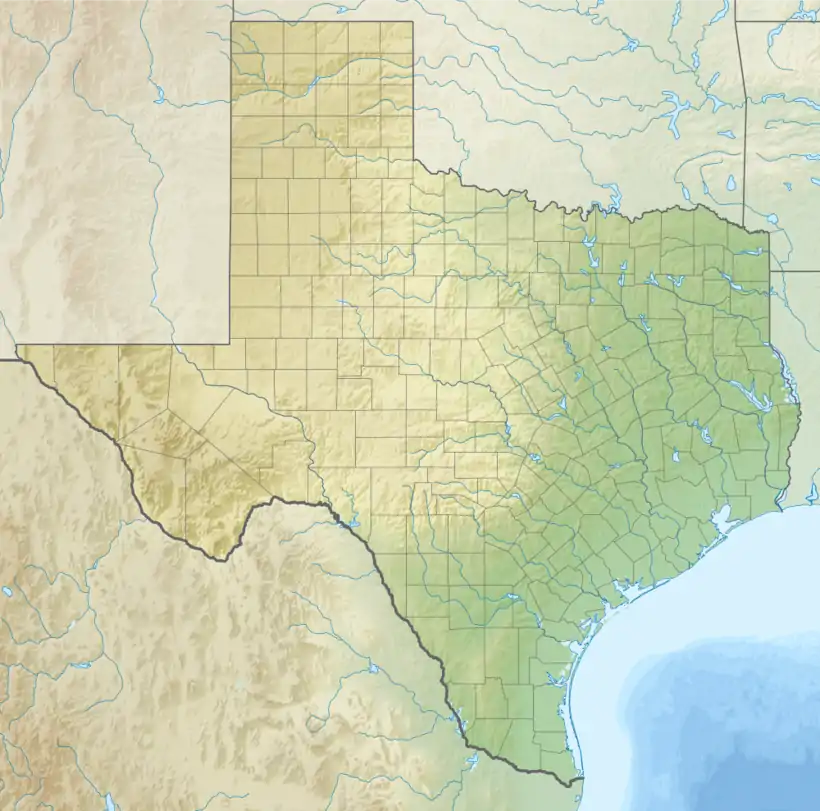 Bastrop State Park  Bastrop State Park | |
| Nearest city | Bastrop, Texas |
|---|---|
| Coordinates | 30°6′39″N 97°16′25″W |
| Area | 2,054 acres (831 ha) |
| Built | 1933 |
| Architect | Herbert Maier et al., A.R. Henry et al. |
| Architectural style | Bungalow/Craftsman, NPS Rustic |
| Visitation | 225,348[1] (2007) |
| Website | Bastrop State Park |
| NRHP reference No. | 97001242[2] |
| Significant dates | |
| Added to NRHP | September 25, 1997 |
| Designated NHLD | September 25, 1997[3] |
History
Over 2,000 acres (810 ha) for the park were donated to the state by the city of Bastrop in 1938. Companies 1805 and 1811 of the Civilian Conservation Corps (CCC) built many of the park facilities between 1933 and 1939 using native stone to blend with the landscape. The facilities were designed by architect Arthur Fehr,[4] and were considered a showcase of park architecture when built, its features serving as a role model for later park development by the CCC. The park was designated a National Historic Landmark in 1997 in recognition of this legacy.[5]
The State of Texas purchased an additional 1,450 acres (590 ha) in 1979 and another 1,000 acres (400 ha) in 2000 to expand the golf course from 9 to 18 holes. Subsequent land purchases by the state in 2001 brought the park to its current size of 5,926 acres (2,398 ha).
In September 2011, 96% of the park was burned by the Bastrop County Complex fire. Only around 100 acres were saved.[6] Most CCC structures were saved, but were still threatened. The park was closed on September 4 due to the fire and did not reopen until December 2.[7] In 2012, a campaign was begun to restore the forest within 30 years by replacing 4 million burned trees.[8]
On May 25, 2015, the earthen dam impounding Bastrop State Park Lake failed after hours of heavy rain in the area. The lake emptied and flooded across Texas State Highway 71. The water moved through a subdivision south of the highway and emptied into the Colorado River.[9]
Features
The park's trails include an 8.5-mile (13.7 km) loop through the park's undeveloped area. The park had an 18-hole golf course, which closed in 2015. The golf cart paths are open to walk on. The large swimming pool is open during the summers.
Bastrop State Park is 4 miles (6.4 km) to the west of Buescher State Park, and the two are connected by Park Road 1.
Flora

The main feature of the park is the stands of loblolly pines (Pinus taeda). This pine woodland is isolated from the main body of East Texas pines by about 100 miles (160 km) of post oak (Quercus stellata) woodlands, giving the Bastrop State Park loblollies the nickname the "Lost Pines of Texas."
In the forested areas, numerous species of fungi may be found, such as Pycnoporus cinnabarinus.
Fauna
Bastrop State Park is home to the largest mating group of the endangered Houston toad on public land. Areas of the park are closed to the public during the toad's mating season in February, March, and April. The park also has white-tailed deer, rabbits, squirrels, Virginia opossums, and nine-banded armadillos. Northern cardinals are one of the species of birds found in the park.
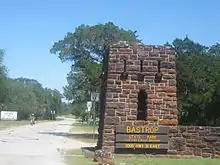
See also
References
- "Texas State Parks: Natural Economic Assets". Window on State Government. Archived from the original on January 7, 2013. Retrieved January 7, 2013.
- "National Register Information System". National Register of Historic Places. National Park Service. July 9, 2010.
- Staff (June 2011). "National Historic Landmarks Survey: List of National Historic Landmarks by State (Texas)" (PDF). National Park Service. Retrieved March 1, 2018.
- "Interpretive Guide to Bastrop and Buescher State Parks" (PDF). Texas Parks & Wildlife Department (TPWD). 2004. Archived (PDF) from the original on 26 January 2010. Retrieved 2010-01-11.
- "NHL nomination for Bastrop State Park". National Park Service. Retrieved 2018-01-03.
- "TPWD: News Release: Sept. 6, 2011: Wildfires Consuming Bastrop State Park".
- Dave Harmon. "Past The Ashes" Austin American-Statesman Nov. 24, 2011 pp 1,7.
- "Archived copy". Archived from the original on 2012-08-31. Retrieved 2012-08-29.CS1 maint: archived copy as title (link)
- "Dam ruptures at Bastrop State Park Lake". Archived from the original on 26 May 2015. Retrieved 26 May 2015.
External links
| Wikimedia Commons has media related to Bastrop State Park. |
- U.S. Geological Survey Geographic Names Information System: Bastrop State Park
- Civilian Conservation Corps work on Texas State Parks
- Bastrop State Park from the Handbook of Texas Online
- Historic American Buildings Survey (HABS) No. TX-3522, "Bastrop State Park, Cabin No. 4, Bastrop, Bastrop County, TX", 6 photos, 5 measured drawings, 1 photo caption page
- HABS No. TX-3522-A, "Bastrop State Park, Refectory", 10 photos, 9 measured drawings, 1 photo caption page
